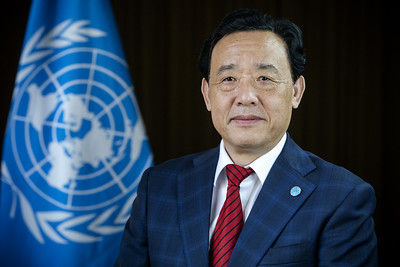
QU Dongyu, Director-General of the Food and Agriculture Organization of the United Nations (FAO), appealed for peace, recognition of the right to food, and reform of multilateral institutions as cardinal imperatives during the G20 Foreign Affairs Ministers Meeting held on Wednesday and Thursday in Brazil.
“FAO calls for the prioritization of actions that promote food security globally to achieve the Four Betters: better production, better nutrition, a better environment, and a better life, leaving no one behind,” Qu said at the first session, focused on the G20’s role in dealing with conflicts in the Middle East and Ukraine and ongoing international tensions.
“We need a global governance system that is fit for purpose, works in an efficient, effective, and coherent manner, is accountable to its members, and fully aligned and committed to achieve all the SDG,” he said at the second session. “When it comes to hunger and poverty it must prioritize people, while also protecting the planet.”
The Meeting brought together the foreign affairs ministers of countries that together represent around 85 percent of global gross domestic product, 75 percent of world trade and around two-thirds of the world’s population. The FAO Director-General was joined at the Meeting by the heads of other international organizations including the International Monetary Fund, the World Bank, the World Health Organization and the World Trade Organization as well as UNESCO, UNCTAD, the ILO and numerous regional development banks.
The Meeting was the first major event of Brazil’s 2024 G20 presidency, which features hunger, sustainable development and global governance as the key priorities. President Lula da Silva of Brazil has also set up a task force with the intention of establishing a Global Alliance Against Hunger and Poverty by the end of the year and open to all countries, not just G20 members.
FAO role and message
Rising food and energy prices in the wake of the COVID-19 pandemic, as well as the war in Ukraine and asymmetrical fiscal and monetary strains, impacted food security beyond traditional hunger hotspots.
The FAO Director-General emphasized the importance of “increased investment to transform global agrifood systems to be more efficient, inclusive, resilient and sustainable,” noting that it will be critical to reduce hunger and bring people out of poverty as well as assure healthier environments.
He pointed to three main pathways by which FAO supports and complements the efforts of the broader UN system: tackling acute hunger; bolstering efficient agricultural markets; and increasing the resilience of all Members and their populations.
The food security work entails a range of activities ranging from FAO’s hosting of the Integrated Food Security Classification (IPC) global support unit, which maps emerging hunger crises around the world, to taking an active role in fostering the goals of the Black Sea Grain Initiative, which aimed to mitigate conflict’s impact on large global trade flows.
The markets work is geared to increasing production and price information and transparency and includes hosting the Agricultural Market Information System (AMIS), which was established by the G20 in 2011 and played an important role in preventing excessive market volatility during the COVID-19 pandemic.
FAO’s work in increasing Members’ resilience to allow their communities to prevent and cope with crisis and shock is geared to the most vulnerable people, including women, youth, Indigenous Peoples and rural farmers. “We need to create opportunities for the poor to increase their incomes and improve their livelihoods,” Qu said, adding that digitalization and innovation as well infrastructure and better education and health services are all priority investment areas.
The Director-General offered FAO’s full support of UN Secretary-General António Guterres’s call to overhaul and renew global governance institutions in line with “21st century economic and political realities.”
FAO, working as a neutral facilitator serving 194 Members, is at the center of a global governance architecture for food security, engaging the International Fund for Agricultural Development, the World Food Programme, the WHO and the WTO along with a partnership of 60 years with the World Bank and other international financial organizations and multilateral development institutions.
Qu pointed to the Global Roadmap for Achieving SDG2 without breaching the 1.5C threshold, which FAO launched at the COP 28 climate summit late last year. That roadmap can act as a catalyst to guide financing for accelerated climate actions to transform agrifood systems and help transformed agrifood systems achieve “good and nutritious food for all today and tomorrow,” he said.

Disclaimer: The comments posted do not necessarily reflect the views of DominicaNewsOnline.com and its parent company or any individual staff member. All comments are posted subject to approval by DominicaNewsOnline.com. We never censor based on political or ideological points of view, but we do try to maintain a sensible balance between free speech and responsible moderating.
We will delete comments that:
See our full comment/user policy/agreement.